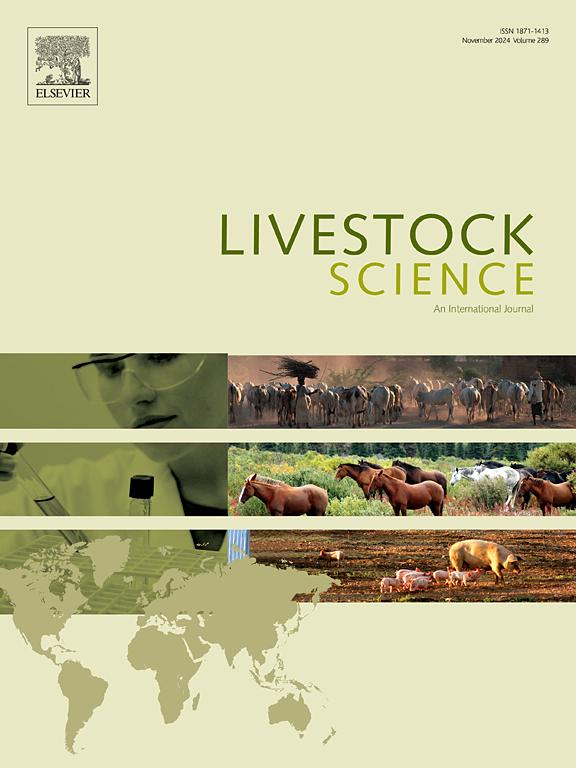The effect of dietary supplementation of a Bacillus-based direct fed-microbial on Pekin duck subjected to heat stress challenge
IF 1.8
3区 农林科学
Q2 AGRICULTURE, DAIRY & ANIMAL SCIENCE
引用次数: 0
Abstract
Limited research investigating the use of direct-fed microbials (DFM) to mitigate the effects of heat stress in Pekin ducks exists. This study evaluated the use of a DFM at different inclusion rates. Treatments included commercial-type basal diet (CON), or CON supplemented with 125, 250, 500, or 750 ppm DFM. On d 21–35, ducks were subjected to a cyclic heat stress challenge for 12 h/d. Performance, gait scores, footpad lesions, complete cell blood counts, total plasma corticosterone concentrations, fear testing, bone health, litter quality, and gut health were measured. Body weight on d 35 was lower for CON (p < 0.05) than all other treatments. Feed conversion (d 15–35) was higher (p > 0.05) in CON than all other treatments. Total plasma corticosterone concentrations and heterophil to lymphocyte ratios were greater for CON (p < 0.05) compared to all other treatments, indicating lower stress susceptibility in DFM treatments. The CON had lower villus height (p < 0.05) than the 125 and 250 ppm DFM treatments. There was a quadratic response observed with 500 ppm as the peak in performance and stress measures indicating it may be the optimum. These results indicate that DFM supplementation during heat stress can improve duck performance and welfare.
日粮中补充一种基于芽孢杆菌的直接饲喂微生物制剂对遭受热应激挑战的北京鸭的影响
有关使用直接饲喂微生物(DFM)来减轻北京鸭热应激影响的研究十分有限。本研究评估了不同添加量的 DFM 的使用情况。处理包括商业型基础日粮(CON)或添加 125、250、500 或 750 ppm DFM 的基础日粮。在第 21-35 天,对鸭子进行 12 小时/天的周期性热应激挑战。对鸭子的表现、步态评分、脚垫损伤、全血细胞计数、血浆皮质酮总浓度、恐惧测试、骨骼健康、产仔质量和肠道健康进行了测量。在第 35 天,CON 的体重(p < 0.05)低于所有其他处理。与所有其他处理相比,CON 的饲料转化率(第 15-35 天)较高(p > 0.05)。与所有其他处理相比,CON 的血浆皮质酮总浓度和嗜异性细胞与淋巴细胞比率更高(p < 0.05),这表明 DFM 处理的应激敏感性更低。与 125 ppm 和 250 ppm DFM 处理相比,CON 的绒毛高度较低(p < 0.05)。在性能和应激测量中,观察到以 500ppm 为峰值的二次响应,表明这可能是最佳值。这些结果表明,在热应激期间补充 DFM 可以提高鸭子的生产性能和福利。
本文章由计算机程序翻译,如有差异,请以英文原文为准。
求助全文
约1分钟内获得全文
求助全文
来源期刊

Livestock Science
农林科学-奶制品与动物科学
CiteScore
4.30
自引率
5.60%
发文量
237
审稿时长
3 months
期刊介绍:
Livestock Science promotes the sound development of the livestock sector by publishing original, peer-reviewed research and review articles covering all aspects of this broad field. The journal welcomes submissions on the avant-garde areas of animal genetics, breeding, growth, reproduction, nutrition, physiology, and behaviour in addition to genetic resources, welfare, ethics, health, management and production systems. The high-quality content of this journal reflects the truly international nature of this broad area of research.
 求助内容:
求助内容: 应助结果提醒方式:
应助结果提醒方式:


